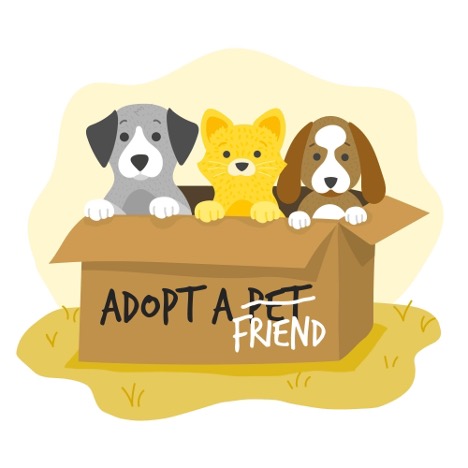Avoid Pet Adoption Scams During The Pandemic

The number of reported pet scams has more than doubled during the pandemic. In addition to all the other types of pandemic-driven fraud, unscrupulous criminals are now taking advantage of people’s loneliness during this isolating time.
A pet adoption scam is when a seller sets up a fake listing of a pet for adoption. They set up cute pictures pulled off the internet to lure consumers. The alleged sellers don’t own any “actual pets”, and are just out to milk victims of all the cash they can.
How pet adoption scams occur
Pet scams begin when you spot an animal for sale online. The listings are typically found on online eCommerce platforms. It’s unfortunate that these forums are not doing more to filter out such frauds, so it’s up to the individual to be well-informed.
If you’re ill-informed you are likely to respond to these fraudulent listings. Once you reach out to the seller and express interest in acquiring the animal, it’s often game over. Next, money is sent to the alleged owner to pay for a pet that doesn’t actually exist.
It’s also common for scammers to request more than just the listed sale price. They typically ask you to cover the cost of things like a ‘ventilated shipping dog crate’, ‘insurance’, or a ‘COVID-19 vaccine’. None of which exist.
Regardless of how much money is sent, the scammers find more ways to get you to part with your hard-earned money. This goes on until it’s too late: until you realize you’ve been scammed. At this point, you’ve unfortunately lost a lot of money.
Why has it become popular during the Pandemic?
The number of people working from home has skyrocketed during the COVID-19 pandemic. In the public interest, many work and shop from home to slow the spread of the virus. Additionally, these people who are working from home also started having a higher interest in adopting a pet. In some places, adoption and foster inquiries increased by 300%.
COVID-19 has also resulted in reputable shelters, pet adoption agencies, and breeder operations getting shut down. Several people are turning to the internet to adopt or purchase a furry companion.
Pet scams in various states are on the rise as scammers take advantage of the status quo. Pet adoption scams increased by 42%, and on craigslist, It is estimated that pet adoption scam online is roughly 80% of pet ads. Furthermore, the better business bureau indicated that in only April of 2020, there were more than 4,000 pet adoption fraud cases. All organizations saw a rapid and exponential increase in these types of scams, statistical search agencies, rescue groups, and more. Consumers are tricked into paying for non-existent pets and the prospects of getting money back are extremely low. Scammers use the pandemic as an excuse to avoid meeting in person.
Common pet adoption scams
We’ll highlight common scamming red flags to not fall for. These are also specific methods fraudsters are using during the pandemic.
You should have your antenna up if you notice the following:
- The seller demands payment by money transfer (e.g Western Union or MoneyGram), gift card, or prepaid debit card, giving the pandemic as the reason not to meet.
- The seller also cites ‘social distancing’ as a reason to not have you collect the pet in person.
- Shipment is continually held up by demands that you wire more money. This could be for pandemic-related ‘add ons’ like COVID-19 vaccines and medications.
- The asking price for the animal is far below the normal rate for a popular breed.
- Emails and texts from the seller or the shipping company have poor spelling and grammar.
How to spot a pet adoption scam and stay safe
Pet scams hook consumers with adorable photos of pets in need of adoptive homes. They typically involve puppies, but any kind of domesticated animal can be the subject of fraud.
This includes but is not limited to cats, older dogs, birds, horses, and exotic pets. Be wary and use the following safety tips:
- Always demand to see the pet in person. Do not give any personal information or money. Your red flag is if the seller refuses. Simply walk away because it most likely is a scam.
- Do a reverse image search by googling pictures of the specific animal you want to buy or adopt. This will often prove that the seller used a fake stock picture to lure you in. You can also google text from the listing. If you find matching images or text on multiple sites, it is most likely a scam.
- Compare market prices of the animal. If the advertised price is far cheaper, then be suspicious.
- Call your local shelter or rescue organization to see if they have any pets available. Additionally, only use trusted and reputable sources to adopt from. They may also inform you of dog adoption scams to avoid.
- Instead of focusing on a specific breed, consider being more open. Local shelters usually have too many pets for the homes in the area. You could find a great companion that way.
- Pass up on offers that require pets being shipped from overseas or out of town. Unless you’re willing to travel or drive to pick it up, just ignore these listings.
- Always avoid wiring money for a pet purchase. If someone asks you to do so that’s a sign it’s likely a fraudulent transaction. You will not receive the pet or see your money again.
- Do your homework when finding the perfect pet. Check out reviews and talk to friends and family. This is to ensure you use reputable sources. Do not be lured by cute pictures.
- Check reviews and references of a seller before doing business. If they refuse to supply any, walk away. Better safe than sorry.
- You know the saying of an offer just being too good to be true. Don’t trust offers that offer expensive breeds for ‘free’. You may end up losing money with those ‘add ons’.
- If an animal is being shipped to you, look up the shipping company and credentials. You can always consult your local resources to verify the legitimacy of a company.
- Work with reputable breeders in your area if you do need a purebred pet. Local animal shelters can provide you with the names of good breeders.
- Lastly, to avoid being scammed online consider waiting to adopt until COVID-19 is well and truly over.
Reporting pet adoption scams
If a fake pet adoption agency has scammed you, contact FTC to report the fraud. You can also contact your local law enforcement and file a police report. This is especially important if money has been stolen.
Stay on top of your credit reports. Visit your bank and report any suspicious activity, especially where you have divulged payment and personal details.
Conclusion
For most people, the pandemic has been a lonely experience. Because of this, it is tempting to go on the internet and look for an animal companion. Thousands of fraudulent pet and shipping websites exist, all waiting to scam potential pet owners. Don’t be their next victim. Follow the tips in this article to stay one step ahead of them.
This article is written by David Lukić. David is an information privacy, security and compliance consultant at IDstrong.com. The passion to make cyber security accessible and interesting has led David to share all the knowledge he has.

